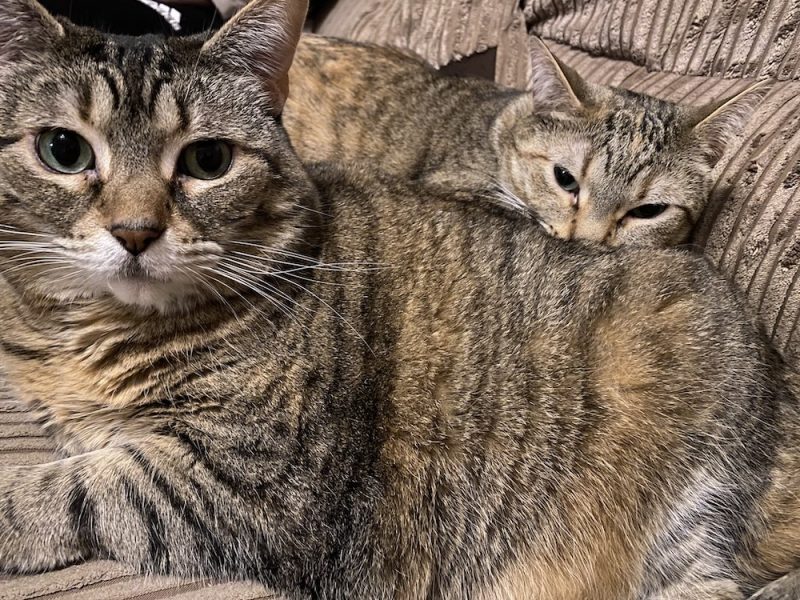Hi, I’m Dr. Lauren! Read my introduction to learn more about me and my two adventurous cats, Pancake and Tiller.
Having your cat spayed or neutered can lead to a lot of complicated feelings. Worry about the procedure, worry about the anesthetic, worries about how to help their recovery process, and guilt over making the decision to do it in the first place. I know how hard it is, as I clean my cats, and the worry, before, during and after, is real!
This article is designed to help you, as an owner, make informed decisions about the importance of these procedures, and what actions you can take to make them sound, safe, and guilt-free. .
Spaying and Neutering 101
Spaying and neutering, in other words, are operations designed to remove the reproductive organs from a female, or male, cat, respectively. They can also be called desexing, or castration. Technically, they can be performed on cats of any age; however, there are compelling reasons to do this while cats are young, which we’ll look at shortly.
So why do we, as veterinarians, strongly recommend that you spay or neuter your cat?
- There is a significant reduction in breast cancer in female cats when they are spayed before their first heat cycle. Breast cancer in cats tends to be very aggressive, and ultimately fatal, so any opportunity to reduce this risk is a valuable opportunity.
- In both males and females, desexing leads to a reduction in unwanted behaviors for domestic cats, including indoor marking, meowing during heat, and roaming. And whole male cat urine is undoubtedly pungent!
- The unowned cat numbers are staggering. Spaying or neutering cats reduces the number of unowned cats.
Ways To Reduce Your Guilt
Guilt. It can be a powerful emotion, and there is no single root cause. Often it involves a sense of self-awareness, and reflection on oneself or one’s actions. When choosing to desex your cat, guilt can arise from a variety of thoughts. You may feel guilty about the stress you are causing your cat, guilty that you have taken away their ability to give birth, guilty about the potential changes your cat may experience after surgery, or guilty that they are “angry” at you.
- If you feel guilty, one of the most important things you can do is talk about it. The earlier the surgery, the better, as you want to be as comfortable as possible on the day your cat has their procedure. Talk to your vet, to start; if necessary, make an appointment, specifically the reason, so they can alleviate your concerns. Also discuss the family, as they are often the reason for the decision, and hence the guilt. Worry can sometimes manifest as guilt, so take time to think through any concerns you have.
- Try not to anthropomorphize; cats do not have the same emotional experience that we have. That’s not to say they don’t have emotions- but they don’t worry or get stressed (as far as we know) in the same way we do. What you are worried about, is probably less important to your cat, who is more worried about dinner coming, and less worried about what happens tomorrow.
- If one of your concerns is post-op guilt, rest assured. Many of the things people worry about, such as a perception that a cat will be less cuddly or resent you for choosing surgery, are usually unfounded.
- Take action. Check out the steps below to find ways to help you take action, and gain more control over the situation, which will help reduce your feelings of helplessness, and therefore guilt. Also, read the Owner’s Manual on Pain that I wrote a few articles back, to better understand what you can look for post-op to help keep your cat as comfortable as possible!

Ways to Prepare to Reduce Your Self-Deficiency
Taking action helps many people feel less guilty. The first thing is to know what to expect for the operation. Asking for a checklist, doing background reading, and having a plan for the day before, during, and after surgery are helpful. Knowing is half the battle, as a famous slogan from the 80s said.
Day Before Surgery
- Your vet will often want your cat to fast at some point; ask for confirmation. In general, however, water is still allowed.
- Don’t wait until now to get the carrier out- this usually indicates a change in your cat! Instead, bring it out a few days before. Grab a favorite toy or blanket that smells like home, and put that in the carrier, too.
- Decide whether you will have your cat microchipped at the time of surgery. This is a good time to do the procedure, because your cat will be anesthetized. This is a highly recommended procedure within the veterinary community, because unfortunately, lost cats can’t tell us where they came from.
Surgery Day
- Learn techniques for putting your cat in the carrier, and use them instead of just putting your cat in, which adds stress to everyone involved.
- If you have sibling cats, consider having surgery on the same day. That way, they smell different, which can sometimes cause tension when one cat smells different than another, after being at the vet for a day.
- Write down any questions you may have, and ask them at the time of dropping off, or picking them up.
- Find out the best number to reach you now, and times you are not available, and let your vet know.
- Know what is normal, and to expect in the days following surgery, before bringing your cat home. Have phone numbers to call if you have any concerns. Does your cat have stitches to take care of, or is it all internal?

Day After Surgery
- Know what medications will be given, and what day, and time of day, they will start
- Know when a retest is needed
- When in doubt, ask
Guilt doesn’t have to be a part of choosing what, most professionals will agree, spaying or neutering is the right choice for your cat.
There is an old surgical saying: “An amputation is an opportunity to heal.” In the case of desexing your cat, nothing could be more true.
This article is part of a series by Dr. Lauren, Pancake, and Tiller.


